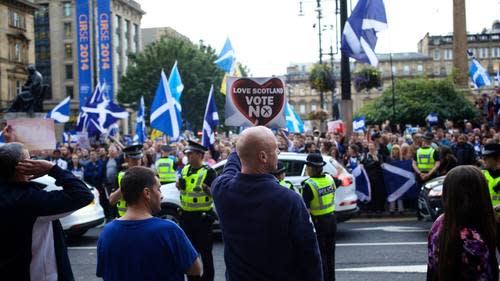A vibrant civil society can move mountains: Lessons from Scotland to Singapore

Scottish, pro-independence and a Star Wars fan. (Photo by Calum Stuart)
Kirsten Han is a Singaporean blogger, journalist and filmmaker. She is also involved in the We Believe in Second Chances campaign for the abolishment of the death penalty. A social media junkie, she tweets at @kixes. The views expressed are her own.
The Ayes were never meant to have it.
When David Cameron and Alex Salmond first negotiated the terms of the Scottish independence referendum in 2012, almost everyone was confident that Scotland would never go for it. Salmond had originally wanted three options on the ballot: to leave the union, to stay in the union, or to stay in the union with “devo max”, which would allow the Scottish Parliament more powers to determine Scottish affairs. Cameron refused to allow the third option, possibly because he thought a decisive No vote would shut the pro-independence faction up for a good long while.
He must really be kicking himself now.
In November 2013 I interviewed Colin Williamson, a pro-independence campaigner who had volunteered with Yes Scotland from its launch in 2012. Even then, over a year into campaigning, he had admitted that it would be an “uphill battle”. It’s not easy to convince people to take a leap of faith; even though the Yes campaign had a strong vision of a better Scotland, there were – and still are – many unknowns, fears that anti-independence campaign Better Together have harnessed with much enthusiasm.
But Colin wasn’t deterred or discouraged in any way. “The biggest grassroots campaign Scotland has ever seen is kicking in,” he told me in that pub in Edinburgh that night.
Now, as we wait with bated breath for the result of the vote that no one has been able to predict with any confidence, I see that Colin was right. No matter what the politicians have said, or what the mainstream UK and international press have reported, the most incredible, invigorating and inspiring part of the independence debate has been the grassroots activities and the efforts of ordinary Scots.
The independence referendum has completely reinvigorated Scottish civil society, and that is something that speaks to me as a Singaporean. Although there has been great participation on both sides of the debate, the Yes campaigners have demonstrated that a diverse, vibrant civil society can move mountains. They have brought the pro-independence movement from being the underdog right to the brink. They have managed to shake the creaky London-centric Westminster institution to its very core.
Although passions have run high and there have undoubtedly been some bad eggs on either side, the debate has also been impressive in its overall level of maturity. This was even noted by the Scottish Police Federation, who said in a statement: “…the referendum debate has been robust but overwhelmingly good natured. … Scotland’s citizens are overwhelmingly law abiding and tolerant and it is preposterous to imply that by placing a cross in a box, our citizens will suddenly abandon the personal virtues and values held dear to them all.”

Better Together campaigners stand across the road from a Yes rally in Glasgow’s George Square one day before the vote. (Photo by Calum Stuart)
Scots have shown that politicians aren’t the only ones with ideas, and that ordinary citizens not only have a place in the ‘political arena’, but are the bedrock on which it rests.
Alex Salmond could never have closed the gap in the polls alone. It happened because of the willing participation of a broad spectrum of Scots: artists touring the country on buses to listen to people’s views, debates organised in schools where 16-year-olds ask questions as fiercely as any old-school journalist, men and women clocking off from work to go knock on doors, jam-packed conferences demanding a new social compact.
After all their efforts over the past two years, it’s unlikely that these people are going to return to political apathy after the vote, whatever the result. Scotland hasn’t seen an unprecedented 97% registration of eligible voters only for all those people to go home on the 19th and pretend nothing has happened.
This hits me hard as a member of Singaporean civil society. It shows me that people – even people who might not possess a degree from an A-list university or have a long-standing “track record” in politics – can have a voice. It shows me that a strong grassroots movement can be diverse and inclusive, bringing in people regardless of their race, ethnicity, nationality, sexual orientation or background. That, if given the chance, people can participate in a wide range of meaningful ways. That it’s not always about a trade-off between civil liberties and national security/stability. That people can write their own narratives, and live them too.
And so regardless of how the vote turns out the Scottish independence referendum has left its mark. Not just on millions of now-engaged people across homes in Scotland, but also on this young, idealistic writer in Singapore, who will probably spend the rest of the day refreshing AreTheScotsIndependentYet.com.

